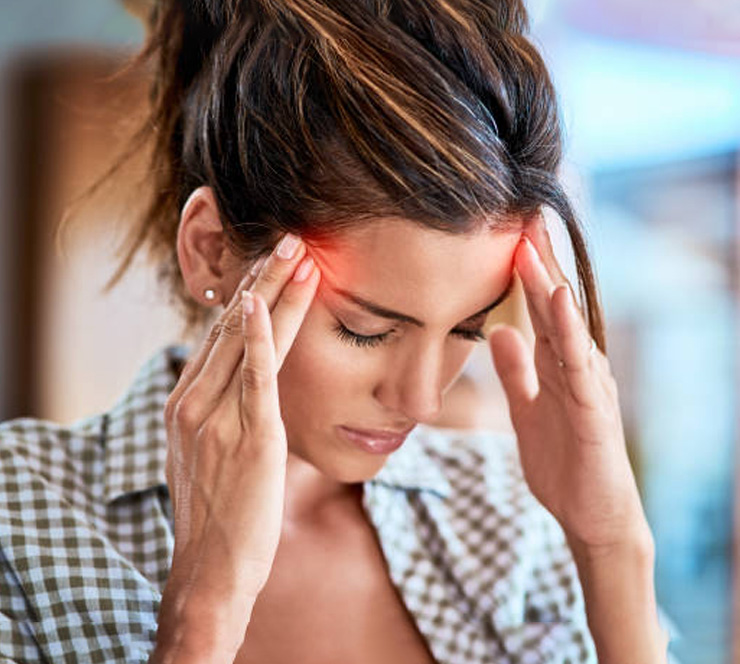
Did you know?
Migraine is the third most common disease in the world with an estimated global prevalence of 14.7%.
Migraine is a neurological condition that can cause multiple problems. It is an intense pounding headache that gradually gets worse. Globally, women suffer from this chronic pain more frequently than men. Any movement, activity, or internal body factors can trigger the pain and make it hurt more.
What causes migraines in women:
It is one of the most talked-about issues. A strong headache often comes with nausea, vomiting, and sensitivity to light. In some people, this pain happens in stages.
Abnormal changes in the level of substances that naturally occur in the brain can cause Migraine in Women. It causes blood vessels in the brain to swell and cause severe pain.
The migraine attacks can be triggered by:
- Lack or too much sleep
- Irregular lifestyle.
- Hormonal changes during the menstrual cycle.
- Stress, anxiety, and depression.
- Too much intake of caffeine
- Foods containing tyramine such as aged cheese, beans, smoked fish and soy products
- Food containing nitrates like lunch meats or hot dogs
Symptoms of Migraine in women:
Migraines occur in stages among different people. These stages may include:
Prodrome:
Research shows that 60% of the people receive early symptoms like:
- Fatigue
- Lack of appetite or food cravings
- Mood changes
- Severe thirst or bloating
- Constipated
- Dtion or diarrhea
Aura
Certain symptoms begin from your nervous system. These symptoms usually start gradually over a period of 5 to 20 minutes or can last more than an hour. These symptoms often involve your vision and include;
- Tunnel vision
- Not able to speak properly
- Having heavy feeling in your arms and legs
- Have ringing in your ears
- Changes in smell, taste, or touch
Attack
A migraine attack is quite common, especially among women. These attacks often begin with a dull headache and can turn into severe pain. During physical activities, these attacks can get worse and the pain can move from one side of the head to the other. Sadly, it feels like attacking your whole head.
Most migraine attacks can last for about four hours. Surprisingly, it is common to get two to four headaches per month.
Postdrome
This stage of headache can last for up to a day. These symptoms include:
- Tiredness
- Mood changes
- Mental exhaustion
Other kinds of Migraines:
Silent Migraine
This migraine is also known as acephalgic migraine. You can have aura symptoms without a headache.
Vestibular Migraine
Such migraines are quite common among people who have a history of motion sickness.
Abdominal Migraine
These migraines often happen among children. It can cause stomach pain, nausea and vomiting.
Hemiplegic Migraine
It includes a short period of paralysis or weakness on one side of your body. You may also feel numbness, dizziness, or vision changes.
Risk factors that cause migraine:
Migraine in Women happens because of changes in the blood flow in the brain. The cues get started when the body releases chemicals like serotonin and calcitonin.
Certain risk factors may include:
- Age: People between the age of 10 to 40 are more likely to suffer from migraines.
- Family History: Four out of five people having migraines are more likely to have it from family history. If one parent has a history of these kinds of headaches, then their child has 50% chances of getting it.
What Triggers Migraine?:
The common migraine triggers are:
- Hormonal Changes
Most women notice they have headaches during this period. During pregnancy or ovulating, hormonal changes are common.
- Stress
Stress or anxiety can also trigger this pain. When you are stressed, your brain releases chemicals. These chemicals can cause blood vessels changes that can lead to Migraine in Women.
- Food
Food and drinks like aged cheese, alcohol, food additives are also responsible for this pain.
- Caffeine
Too much intake of caffeine can also cause this problem.
- Weather Changes
Changes in weather conditions, barometric pressure, or strong winds can also trigger a migraine.
- Changes in your sleep might get you a migraine. Too much sleep and not getting enough sleep can cause such headaches.
Why choose Smt. Paarvati Devi Hospital for treatment?:
With its advanced medical treatment and top-notch facilities, Smt. Paarvati Devi Hospital emerged as a pioneer in the healthcare sector. With a team of the best neurologists in Amritsar, we aim at giving the best healthcare services to the common man.
Our vision is to serve people with hands to cure and a heart full of dedication and empathy. We have set new standards for healthcare services and to maintain proper hygiene.
Leading Neurologists in Amritsar:
Smt. Parvati Devi Hospital has the best neurologists for treating all the skull, brain, spine, and spinal cord problems. The main motive is to compile the best techniques for treating brain-related problems.
The hospital has a team of some of the best neurologist in Amritsar Our surgeons are capable of treating any kind of brain disorders. Reach out to us and get world-class treatment.
